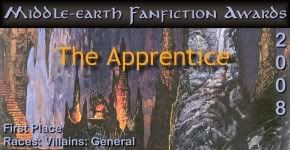The Apprentice by pandemonium_213
Fanwork Notes

Banner by Elena Tiriel
Warnings are given for examination of a Man's disturbed thoughts and sexual predilections: non-consensual sex and pederasty are commented upon in Chapters 7 & 9, but there are no explicit descriptions. The Adult rating is also given for some violent imagery in Chapter 12. As for the alternate universe business and my affection for "scientifiction," well, forewarned is forearmed.
- Fanwork Information
-
Summary:
An ambitious young Noldorin man of Ost-in-Edhil lands a coveted appointment as an apprentice to the most skilled master smith of the Gwaith-i-Mirdain: Istyar Aulendil. The apprentice's mentor, a prodigy of the Aulënossë, has been sent to Middle-earth by the Valar and has knowledge of exotic and wondrous technology. Istyar Aulendil also has notoriously high standards. The apprentice must meet his mentor's expectations if he is to become a journeyman and work on an important new initiative.
MEFA 2008: First Place, Villains, General.
Major Characters: Celebrimbor, Original Character(s), Sauron
Major Relationships:
Artwork Type: No artwork type listed
Genre: Drama, General, Science Fiction
Challenges:
Rating: Adult
Warnings: Rape/Nonconsensual Sex, Expletive Language, Violence (Moderate)
Chapters: 13 Word Count: 37, 101 Posted on 4 August 2007 Updated on 4 August 2007 This fanwork is complete.
Table of Contents
Yes, it's verbose, but perhaps worth a gloss-through of a read.
A short list of primary characters and a glossary may be found in the End Notes of this chapter.
Glossary in End Notes.
Glossary in End Notes.
See end notes for commentary on canon and the Rings of Power.
Comments in End Notes.
As of 04/29/2008, modifications have been made to this chapter so that it aligns, although perhaps not seamlessly, with The Elendilmir, the sequel to The Apprentice.
Glossary and comments in End Notes.

Comments
The Silmarillion Writers' Guild is more than just an archive--we are a community! If you enjoy a fanwork or enjoy a creator's work, please consider letting them know in a comment.